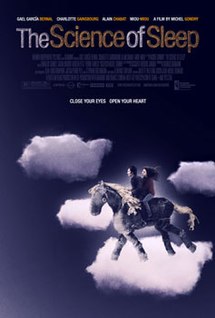The Science of Sleep
| The Science of Sleep | |
|---|---|

Theatrical release poster
|
|
| Directed by | Michel Gondry |
| Produced by | Georges Bermann |
| Written by | Michel Gondry |
| Starring |
Gael García Bernal Charlotte Gainsbourg Miou-Miou Alain Chabat |
| Music by | Jean-Michel Bernard |
| Cinematography | Jean-Louis Bompoint |
| Edited by | Juliette Welfling |
|
Production
company |
|
| Distributed by |
Gaumont (France) Warner Independent Pictures (US) |
|
Release date
|
|
|
Running time
|
106 minutes |
| Country | France Italy |
| Language | English French Spanish |
| Budget | $6 million |
| Box office | $15.3 million |
The Science of Sleep (French: La Science des rêves, literally The Science of Dreams) is a 2006 surrealistic science fantasy comedy film written and directed by Michel Gondry. The film stars Gael García Bernal, Charlotte Gainsbourg, Miou-Miou, and Alain Chabat. The film stems from a bed-time story that was written by Sam Mounier, then-10-year-old.
Stéphane Miroux is a man whose vivid dreams and imagination often interfere with his ability to interact with reality. He is coaxed back to his childhood home after his divorced father passes away and his mother, Christine, finds him a job in a calendar printing company in France. His mother implies the position is a creative role, and he prepares colourful drawings, each showing a disaster, for his "disasterology" calendar. However, nobody appreciates his talents and it transpires that his mother had led him on - the real vacancy is for nothing more than mundane typesetting work. While leaving his apartment to go to work one day, Stéphane injures his hand helping his new neighbor move a piano into her apartment. The new neighbor, Stéphanie, invites Stéphane into her apartment (unaware that he lives next door) where her friend Zoé tends to his wound. Stéphane initially forms an attraction to Zoé, though he suspects it is instead Stéphanie who likes him.
Stéphane realizes that Stéphanie, like him, is creative and artistic. They plan a project for use in a short animated film. Following the advice of Guy, Stéphane's sex-obsessed co-worker, Stéphane pretends that he isn't Stéphanie's neighbor, pretending to leave the building when he leaves her apartment. That night, when he is sleepwalking he writes a confusing note to Stéphanie that asks for Zoé's phone number. Stéphane realizes his mistake upon waking and retrieves the letter with a coat hanger, unaware that Stéphanie has already read it.
Surrealistic and naturalistic elements begin to overlap, and the viewer is often uncertain of which portions constitute reality and which are merely dreams. One such sequence, in which Stéphane dreams his hands become absurdly giant, was inspired by a recurring nightmare director Michel Gondry had as a child. As this line gradually becomes more blurred, Stéphane becomes more enamoured with Stéphanie the more he spends time with her and shares his many inventions with her, such as the "one-second time machine," a device that can go either forward or backward in time by only one second. Stéphane's dreams encroach on his waking life as he tries to win Stéphanie's heart and misses time at work. He breaks into her apartment, taking her stuffed toy horse, and implants a mechanism inside of it that will make it gallop. While putting it back into her apartment, Stéphanie arrives and catches him, demanding he leaves and becoming more upset with him. Embarrassed and heartbroken, Stéphane retreats to his own apartment where he receives a call from Stéphanie, who apologizes and thanks him for the gift she discovers: a galloping version of "Golden the Pony Boy," who she reveals was named after Stéphane.
...
Wikipedia
